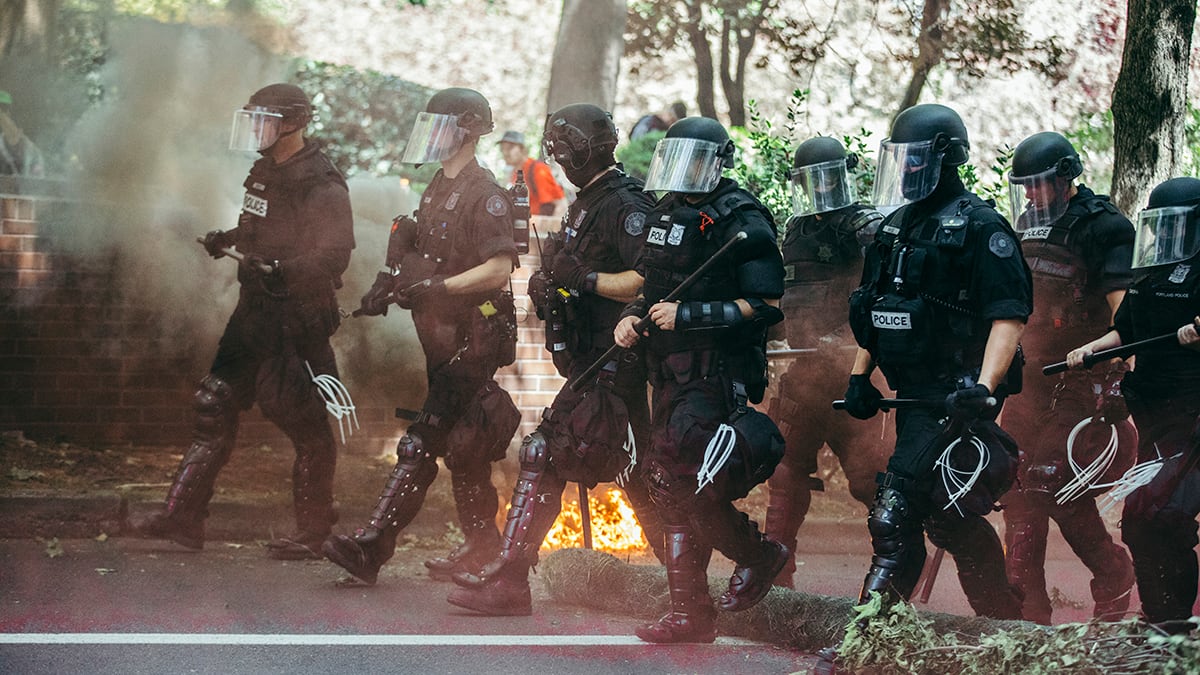Portland’s public safety landscape has undergone tectonic shifts in under 72 hours.
On June 15, the day after the Portland Police Association filed for closed-door mediation to hash out its contract with the city, the Multnomah County District Attorney’s Office announced that a grand jury had indicted Portland Police Officer Corey Budworth on one count of assault in the fourth degree for his use of force at an August 2020 protest.
Budworth, now on administrative leave, was a part of the Portland Police Bureau’s Rapid Response Team, a 50-member unit most known for its management of protests. RRT members, whose assignment on the team is voluntary, receive specialized training in “crowd psychology and behavior [and] team formations and movements,” according to PPB.
Hours after Budworth’s indictment, news broke that Erik Kammerer, a squad leader for RRT who is also a homicide detective for the Police Bureau, is under review by the Oregon Department of Justice for potential criminal prosecution. (WW has reported extensively on complaints alleging Kammerer used excessive force during protests.)
Around 10 pm on June 16—the day after the indictment—conservative talk radio host Lars Larson reported the exodus of RRT officers from the unit following a Wednesday night vote.
While the RRT members are still employed by the Police Bureau, the unit’s vote to disband seemingly left a hole in the city’s ability to respond to what is perhaps the most divisive and expensive element of public safety in Portland: protests. At least one demonstration is planned for tonight.
In response, Mayor Ted Wheeler—who said he learned of the RRT dissolution late Wednesday night—has activated mobile law enforcement units in PPB and requested assistance from Oregon State Police.
“I have directed the Portland Police Bureau to prepare mobile field forces to respond to any public safety needs, including potential violence related to mass gatherings,” Wheeler said in a statement Thursday. “Also, I have spoken to Governor Brown, and the Oregon State Police is making members of its Mobile Response Team available on standby. We are also coordinating with other regional law enforcement partners.”
Wheeler also said that he heard directly from RRT members during an impromptu Thursday morning Zoom meeting between the mayor’s office and law enforcement.
“I want to acknowledge the toll this past year has taken on them and their families—they have worked long hours under difficult conditions,” Wheeler said. “I personally heard from some of them today, and I appreciate their willingness to share their concerns about managing the many public gatherings that often were violent and destructive.”
Despite last night’s resignations, it is unclear whether RRT officers are actually swearing off protest assignments. Acting Police Chief Chris Davis indicated today they will still respond to protests, if ordered to do so.
“All of these officers who are on RRT still work for the Police Bureau,” Davis said during a press conference today. “And so we can still have them come in and function as police officers, including in one of those situations as we need to direct them to do so. No one on RRT is saying that they won’t follow lawful and policy-authorized direction that they’re given by the management of the Police Bureau.”
Davis added that he’s directed the Police Bureau to stand up an Incident Command Team at least for Thursday night, and potentially through the remainder of the weekend.
Commissioner Jo Ann Hardesty, a longtime advocate of police reform in Portland, called the RRT resignations “an opportunity to commit change.”
“We should formally disband the RRT, but through council action,” Hardesty said in a statement Thursday. “The good old boy network is crumbling and we can either be a part of the change or part of the status quo—but the arc of justice is bending quickly and it’s imperative that the Portland City Council lands on the right side of history.”
Hardesty went on to describe the RRT members as “staging their own protest” through their resignations, which she said occurred “the moment there is a possibility for accountability for inappropriate and potentially illegal conduct.”
“When will PPB recognize this overwhelming desire for change and align their values with the people of Portland?” Hardesty said. “I remain deeply concerned these RRT resignations are yet another example of a rogue paramilitary organization that is unaccountable to the elected officials and residents of Portland.”
Indeed, the central question posed by the unit’s sudden disbandment is whether Portland police officers will continue to confront demonstrators if they know they risk indictment for their use of force on the protest line.
During Thursday’s press conference, Acting Chief Davis described accountability as “a cornerstone of our profession,” adding that it is important for PPB employees to be afforded due processes provided under the law and the bureau’s collective bargaining agreement with the city.
“I don’t think anyone among all of our police professionals objects to people being held accountable,” Davis said. “I expect the district attorney’s office to perform its role in holding people accountable for criminal conduct, whether those people are Portland police officers or anyone else.”
District Attorney Mike Schmidt, who has encountered repeated rifts with PPB during his freshman year as the county’s top prosecutor, issued a statement Thursday indicating a commitment to community trust.
“I have confidence that the bureau will continue their mission to maintain public safety,” Schmidt said. “In the meantime, my office will continue to focus on the fair and just prosecution of criminal matters. We cannot expect the community to trust law enforcement if we hold ourselves to a lower standard.”
Commissioner Mingus Mapps issued a statement tonight vowing support for both Schmidt’s office and Portland police officers.
“2020 was a historically challenging year and mistakes were made by public safety officers,” Mapps said. “These mistakes are rightly being examined by our district attorney. At the same time, our city has endured nightly rioting, arson and vandalism. I will continue to support our public safety officers while also reforming how we police in our city.”

